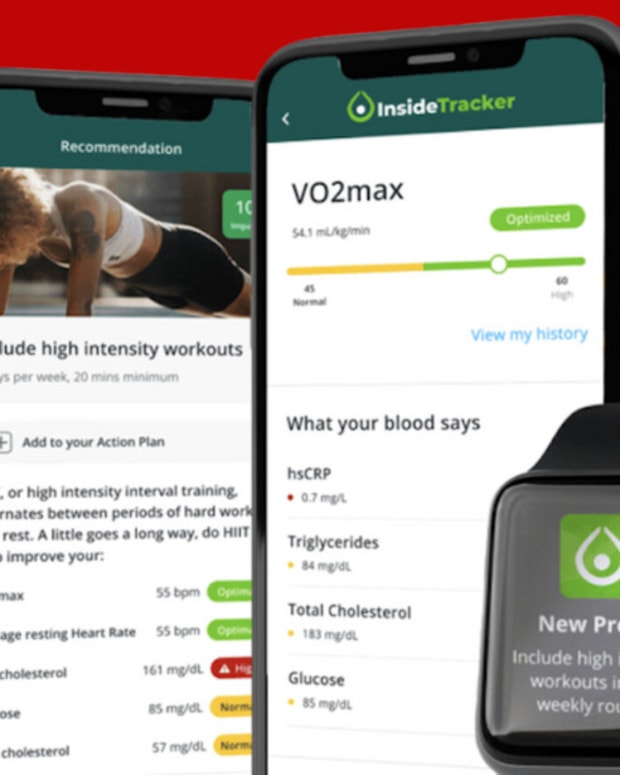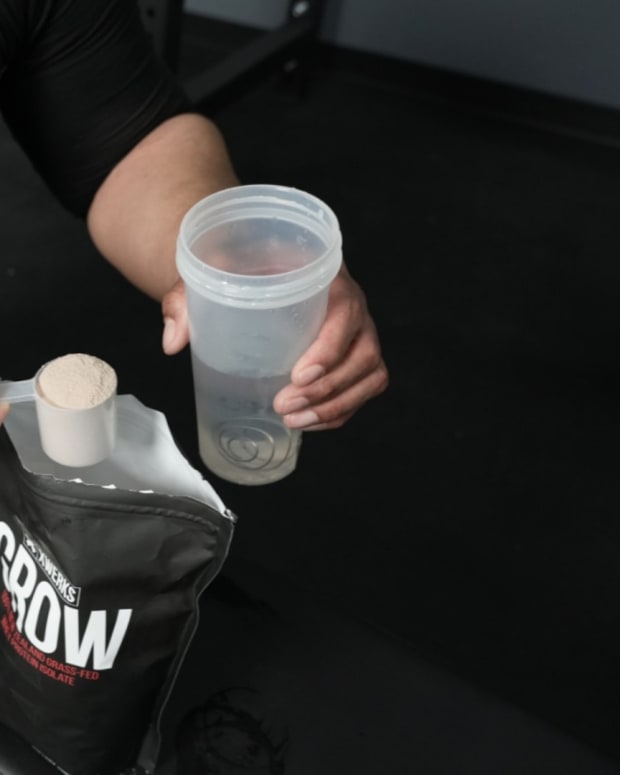The products featured in this article have been independently reviewed. When you buy something through the retail links on this page, we may earn commission at no cost to you, the reader. Sports Illustrated editorial staff are not involved in the creation of this content. Learn more here.
Key Features:
- Cost: $899 (self-study), $1,399 (self-study premium), $1,899 (all inclusive), $3,499 (elite trainer bundle)
- Study materials: Online course, open-book at-home exam option, learning videos, exercise demonstration library, resource library, audio chapter summaries, practice exams and quizzes
- Requirements: High school diploma or GED required, current AED and CPR certifications, score a 70 or higher on the exam
- Accessibility: Accommodations available for those with disabilities by filling out the NASM Request for Accommodations form
- Pass rate: 74 percent
- Avg time to complete: Must take the final exam within 180 days of enrollment in the course
If you’re considering becoming a certified personal trainer, your first step is finding out what the best personal trainer certifications are. I have personally been through NASM’s CPT course twice plus the CPT course from the National Federation of Personal Trainers (NFPT), so I know from experience that it can be difficult to decide which is best for you.
In this article, I’ll give you an in-depth review of the NASM CPT, including the cost, what you’ll learn in the course, my experience using the online learning platform and even what to expect on the test. I’ll also compare NASM to a handful of other popular CPT courses such as ACE, ISSA, NCSA and NFPT. All of these programs have excellent accreditations, so I will not only compare the name recognition but also the costs and course content of each.
What Is NASM?
NASM stands for The National Academy of Sports Medicine. NASM is a for-profit company that trains fitness professionals looking to break into the fitness industry, advance their existing careers or get a certificate to prove their knowledge in a specialization. NASM’s certified personal trainer (CPT) course is one of the most popular and recognizable CPTs you can find.
The Pros of NASM
- Very recognizable CPT in gyms across the country
- Teaches the NASM optimum performance training (OPT) model that can be used to design any basic training program
- Easy-to-use digital learning platform to prepare for certification exams
- Plenty of study materials that range from a full textbook to audio chapter summaries to help you prepare for the exam
- Bundle options that include CPT plus additional certifications like certified nutrition coach (CNC) for a discounted price
The Cons of NASM
- Limited additional, specialized certifications compared to other organizations
- Continuing education units (CEUs) are required to re-certify and they can be expensive
- Limited training available on smart workout technology
Factors to Consider Before Purchasing NASM
Price
Becoming a NASM-certified personal trainer is not cheap. The courses range in price from $899 for the self-study course (CPT only) to $3,499 for the elite trainer bundle—which includes the CPT, corrective exercises specialization, certified nutrition coach course and the performance enhancement specialization.
The good news is, you’ll rarely have to pay the full price. NASM runs discount specials constantly. The first time I purchased the CPT course back in 2017, I paid $750 for the self-study course. Unfortunately, my certification expired which meant I needed to take the course again to re-certify. My second purchase was made in early 2023 and it cost $650. NASM also offered me a 50 percent discount on the certified nutrition coach course.
These discounts are frequent, but they are limited to a certain number of purchases. If you miss one it will likely come around again, but if you can’t afford to wait, NASM also offers an interest-free monthly payment plan.
Course Options
Self-study ($899 regular price). The self-study course is the most basic course you can purchase from NASM. This course is 100 percent online and includes:
- NCCA Accredited-Exam
- Open-Book At-Home Exam Option (however, this is a certificate instead of a full certification)
- Access to the NASM digital learning platform (online) and the NASM Edge Mobile App
- Digital textbook with audio chapter summaries
- Learning videos
- A library of resources, handouts and exercise demonstrations
- A practice exam
- A comprehensive study guide
Self-study premium ($1,399 regular price). The self-study premium is a step up from the basic self-study package. It includes everything listed above in the self-study course along with:
- A job guarantee
- Unlimited access to NASM fitness experts
- A free retest of the NASM exam
The job guarantee is legit. NASM guarantees that you’ll get a job within 90 days of completing your CPT or you get your money back.
All-inclusive ($1,899 regular price). The all-inclusive package is everything that comes with the self-study premium package plus:
- NASM Gymternship™
- A hardcopy textbook
- An online CPR/AED certification (which is required before you take the CPT exam)
Elite Trainer bundle ($3,499 regular price). The Elite Trainer bundle is the ultimate package of everything NASM has to offer. With this bundle, you’ll get everything in the all-inclusive package plus three additional certification courses:
- Corrective Exercise Specialization (CES)
- Certified Nutrition Coach (CNC)
- Performance Enhancement Specialization (PES)
If you were to buy these courses individually the price totals over $2,400. Right now, NASM is offering this bundle for $2,209.
Course layout
The NASM online course is very intuitive and easy to follow. You can log in to your NASM account from any page on the website, then navigate to your online course through the student portal.
The course starts with an option virtual tour that will teach you all of the features NASM’s online learning platform has to offer. The virtual tour is very useful if you’re unfamiliar with online learning, but I found the layout pretty intuitive. The course is divided into these six sections:
- Section 1: Professional Development and Responsibility
- Section 2: Client Relations and Behavioral Coaching
- Section 3: Basic and Applied Sciences and Nutritional Concepts
- Section 4: Assessment
- Section 5: Exercise Technique and Training Instruction
- Section 6: Program Design
Each of these six sections is divided into chapters from the digital textbook, and divided again into lessons in each chapter. It sounds complex, but essentially, the course is broken down into bite-sized chunks that you can complete at your own pace.
Each chapter also includes a review quiz to help you see any gaps you have in your knowledge before moving on. In my experience, if you’re acing the review quizzes then you are on the right track to do well on the exam.
Training Model
The CPT exam is a comprehensive exam that covers anatomy and physiology, behavior, professionalism, building a brand and general fitness training. But the NASM CPT also covers NASM’s OPT training model. OPT stands for Optimum Performance Training, and it focuses on diagnosing and correcting muscular imbalances, joint pains, bad posture and other common body pains that are common due to a sedentary lifestyle.
The OPT model methodology emphasizes what NASM calls “integrated training”—which includes structured periods where you will work with your clients to increase flexibility, core strength, balance, plyometric power, speed, agility and quickness. You’ll also include cardio training and resistance training. When you use the OPT structure to improve your client’s strength and performance in these key areas, NASM says you are decreasing their injury risk and improving their body’s adaptability to accommodate their work demands.
The OPT model has five phases. As a NASM CPT, you’ll be encouraged to design all of your clients’ workouts following these phases in sequential order:
- Phase One: Stabilization Endurance
- Phase Two: Strength Endurance
- Phase Three: Muscular Development
- Phase Four: Maximal Strength
- Phase Five: Power
Taking the test
The NASM CPT test has two forms: the at-home, open-book certificate exam and the NCCA (National Commission for Certifying Agencies) certified exam.
The at-home, open-book exam option is not proctored, and it is not accredited. If you take this exam you’ll have three hours to complete 100 multiple choice questions. However, I want to make sure to be clear: If you take this exam it is not accredited which means you will not be a certified personal trainer in the eyes of gyms and potential companies you work for.
There's also the NASM Certified Personal Trainer Exam. The NASM CPT certification exam is NCCA accredited. This is a closed-book exam with 120 multiple choice questions. You have a 120-minute time limit to take this exam and it is proctored either at an in-person testing center or through a third-party online proctoring service.
Additional Certifications
The fitness industry is growing, and that means you may want additional certifications to help you offer a wider range of services to your clients. NASM has a long list of additional certifications that includes:
- Certified Nutrition Coach
- Certified Sports Nutrition Coach
- Physique and Bodybuilding Coach
- Weight Loss Specialization
- Group Fitness Instructor
- Senior Fitness
- Home Gym Design
- Youth Exercise
- Women’s Fitness
There are several more specializations and certifications available on NASM’s website that range in price. These additional certifications also count toward your CEUs that you’ll need for recertification.
Recertification
With a NASM CPT, you’ll need to re-certify every two years. There is a $99 recertification fee along with 2.0 CEUs (continuing education units) total. 1.9 of those CEUs come from either NASM’s continuing education courses or a course from one of NASM’s preferred providers. The other 0.1 CEU comes from keeping your CPR/AED certifications up to date.
The library of CEUs that NASM offers is extensive, and in my opinion, one of the best reasons to choose NASM for your CPT. Like I said before, any of NASM’s additional certifications and specializations count toward your CEUs, but they also offer unaccredited CEU courses like:
- Mental Toughness
- Cardio Training
- Corrective Exercises for Basketball Training
- Balance Training
- How to Read Research Papers
- Hydration Training
These CEUs are for fitness professionals who want to expand their knowledge in other areas to better serve their clients.
NASM Test Outcomes
Accreditation
If you want to become a professional personal trainer then one thing you have to understand is the difference between accredited certifications and non-accredited certifications. Gyms and other facilities in the fitness industry will be looking for trainers with accredited certifications.
There are eight programs with the NCCA accreditation that NASM has. I’ll compare some of the other programs to NASM below, but regardless of what you choose, make sure you’re getting a CPT from one of these accredited programs.
Careers
So you completed your NASM CPT, what's next? Fortunately, there are many different paths you can choose. The most obvious career choice is to get a job at a local or commercial gym training clients. Some people may worry that the rise of fitness apps and smart home gym equipment like Tonal and Tempo may limit your opportunities in those jobs, but your skills as a certified personal trainer will always be in demand. Here are a few possible careers to consider:
- Fitness industry sales. With a CPT you’ll gain significant knowledge about how the body works and what equipment to use to train certain muscle groups. That knowledge can give you a better understanding of how to sell fitness equipment, services or apparel to the people who need it most.
- Online personal training. Personal training apps and online personal trainers are growing in popularity. Along with that growth, there are potential opportunities for qualified trainers to work for companies like Peloton, Future and others.
- Group fitness classes. There are many gyms like Orangetheory that hire personal trainers to design and teach group fitness classes. With NASM’s CPT and a Group Fitness specialization, you’ll be more than ready to take on a group fitness challenge.
- Nutrition coaching. Adding a nutrition coaching certification to your CPT can put you in a position to give well-rounded insight to clients who are trying to balance their diet for health, weight loss or athletic performance reasons.
- Corporate wellness. Many corporations are beginning to understand the importance of physical health for their employees. That has led to some companies hiring personal trainers with specializations in corrective exercises to help their employees avoid injury on the job or rehab an old injury.
- Athletic coaching. If you’re interested in sports-related coaching, NASM offers a specialization in youth sports, strength and conditioning and other related areas.
Salary
Certified personal trainer salaries vary depending on where you live, how much experience you have and what company you work for. However, if you purchase a bundle that includes NASM’s job guarantee you can expect to find a job that pays between $20 and $35 per hour starting out (according to NASM).
How NASM Compares
NASM vs. ACE
Recognition. The American Council for Exercise (ACE) is one of NASM’s main competitors. According to ACE there are over 90,000 current ACE-certified professionals. That is significantly more than NASM, which has 75,020. That means that ACE is at least as recognizable as NASM, if not more. Here are a few more of the details comparing the two programs:
Cost. NASM’s CPT packages range from $799-$3,499 while ACE’s range from $675-$975.
Overall, ACE is cheaper than NASM. However, those numbers are for ACE CPT only whereas NASM offers the CPT plus additional certifications in a bundle package. The most basic CPT package for each is fairly comparable: $799 for NASM (with frequent discounts available), $675 for ACE. As I said before, I’ve bought two NASM CPT courses and both were less than $799.
What you learn. Both NASM and ACE teach you principles about general fitness and wellness to help you coach clients to better health. However, NASM’s CPT focuses on specialized training that helps you identify and correct muscular imbalances that come from a sedentary lifestyle (this is the OPT model), plus teaches you how to encourage behavior change so your clients can live healthier in future.
NASM vs. ISSA
Recognition. According to ISSA, its CPT is accepted at over 10,000 gyms. NASM makes the same claim on its website, plus NASM has partnerships with commercial gyms that help you get a job faster after completing the CPT.
Cost. NASM self-study starts at $799 and ranges up to $3,499 while ISSA’s courses start at $1,200 and range up to $2,400. The major difference between the two is that even ISSA’s basic course offers specializations on top of the CPT, while NASM's basic course offers just the CPT.
What you learn. The course material is where ISSA may have an edge over NASM. ISSA encourages very specialized training from the start. Its elite bundle that costs $2,400 has six courses included—CPT, nutrition, wellness, etc.—whereas NASM’s highest bundle only offers four.
If you're interested in both these programs, check out our NASM vs. ISSA review for more information.
NASM vs. NSCA
Recognition. The National Strength and Conditioning Association (NSCA) is a non-profit organization that is “dedicated to advancing the strength and conditioning and related sport science professions around the world.” On the other hand, NASM is for profit, meaning it puts time and effort into building a brand. Likely, you’ll come across more people who recognize NASM than they do NSCA.
Cost. NCSA structures its CPT program a little bit differently than other organizations. With NCSA you have to purchase a membership to the organization to access the materials. That membership costs $130 per year for the standard membership. From that membership, you can purchase the CPT exam for a discounted rate, plus access NCSA’s study prep materials.
What you learn. Because it is non-profit, NSCA puts most of its effort into providing resources for people who work in the strength and conditioning industry. A membership to NSCA includes all of the information you’ll need to study and pass the CPT, plus journals, case studies, podcasts, exercise libraries and more. If learning is what you’re after, then NSCA might be the best certification for you.
NASM vs. NFPT
Recognition. Anecdotally, not many people I’ve talked to have heard of NFPT. However, NFPT has over 80,000 trainers (more than NASM). I have also personally gone through the NFPT CPT course and its Fitness Nutrition Coach course. The learning platform is far simpler than NASM, but the content is just as good.
Cost. Cost is where NFPT’s certification program sets itself apart. Initial certification ranges from $249 for the exam only to $499 for the premier package (all of the support, resources and exam prep NFPT has to offer). That is far more affordable than NASM which costs $799 for the simplest package. Plus, when you recertify with NFPT, almost all of the CEUs are less than $250, including specializations.
What you learn. NFPT’s CPT exam is more general than the NASM CPT exam because it lacks the patented OPT model that NASM teaches. However, NFPT has more specialized content available after you are certified with your CPT—specializations like Endurance Training, Functional Training and Cancer Recovery.
NASM FAQs
Is the NASM personal training exam hard?
The NASM personal training exam is challenging, but if you purchase a CPT course from NASM you will have everything you need to prepare and succeed. My advice is to use the practice test that is included in your course to see where your knowledge gaps are. The pass rate of the NASM CPT is 74 percent.
How long do you need to study for the NASM certification exam?
In a NASM CPT course, you are given 180 days (about six months) to study and prepare for the exam. If you have background knowledge in exercise science or physiology then you likely won’t need the whole study period. However, the course is all online and you can move at your own pace.
How much is the NASM personal training certification?
NASM personal training certifications start at $799 for the self-study program. However, there are other bundles that include more study materials, test retakes, more resources and even more certifications if you want to take advantage of them.
What can I do with my NASM personal training certification?
Once you get your NASM CPT you can do a range of different things from applying for personal trainer jobs at local gyms to coaching clients on your own. You can also use your knowledge in other roles in the fitness industry like sales and consulting.
Final Thoughts
A NASM CPT will get your foot in the door of the fitness industry because it is widely recognized as an elite certification. As you grow as a trainer, you may opt to re-certify with other organizations that offer more specialized training, but the foundation knowledge that NASM offers—about the fitness industry, planning workouts, helping clients live healthier lives and so much more—makes the NASM CPT more than worth the cost in my opinion.
Prices are accurate and items in stock as of publish time.












